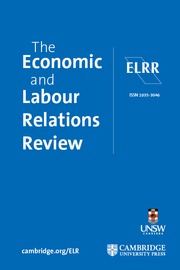-
- You have access: full
- Open access
- ISSN: 1035-3046 (Print), 1838-2673 (Online)
- Editor: Diana Kelly University of Wollongong, Australia
- Editorial board
As of 2026, all articles are published on an open access basis.
December Article of the Month
Our December article of the month comes from our double issue themed collection on Gender and Emerging Work Issues as well as the Great List of Unasked Questions Answered. The proposition that unpaid, female-dominated work that occurs in the domestic sphere is undervalued – when valued at all – is not new. It is perhaps surprising, therefore, that research on how to value this work is relatively nascent. In this article, Julie P. Smith argues first that human milk can be valued and second that the values produced can be used as a robust proxy for valuing women’s unpaid breastfeeding work. While accurately valuing women’s contributions to society – both in a national accounting sense and a moral one – may be all the justification needed for this work, the results may have significance in some surprising directions, such as sustainability and development agendas. This is a thoughtful and innovative article that uses economic theory in a novel way to promote and enable social justice. We are very proud to have published it. 2025 has been a productive year for the ELRR. We thank all our authors, reviewers, editorial staff, our Cambridge University Press colleagues, our editorial and advisory boards and, in particular, our hard-working Editor-in-Chief, Diane Kelly. Best wishes to all for a peaceful and restful holiday period from ELRR.
Economics « Cambridge Core Blog

-
Revising An Economic History of Europe for a Rapidly Changing World
- 05 August 2025,
- How we updated the classic textbook An Economic History of Europe to reflect changes both in the world and in how we teach and learn economic history.

-
Business Analytics: Methods and Cases for Data-Driven Decisions
- 02 May 2025,
- Business Analytics, a new textbook from author and professor Richard Huntsinger is uniquely designed for both the business-oriented and data science-oriented...

The ELRR Socials